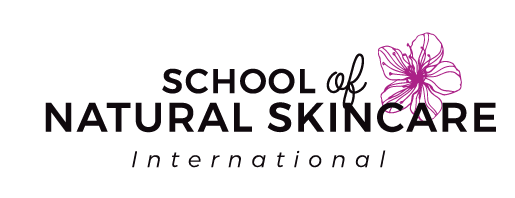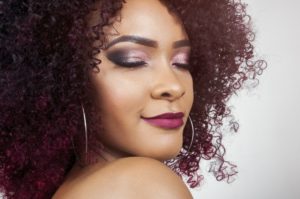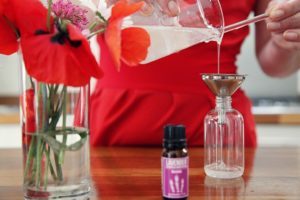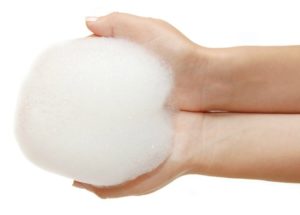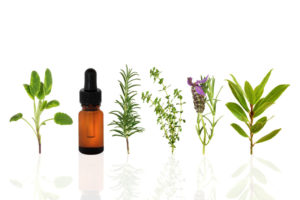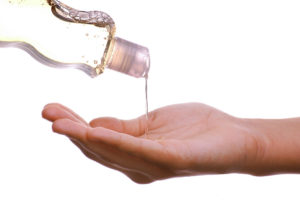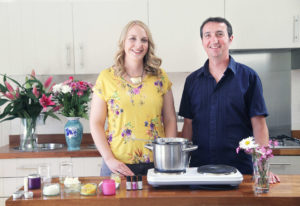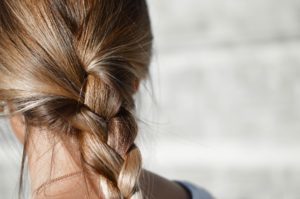
Accredited, multi-media online course. Study from anywhere in the world.
Natural beauty lovers don’t want to compromise between products that work and products that support their most cherished values.
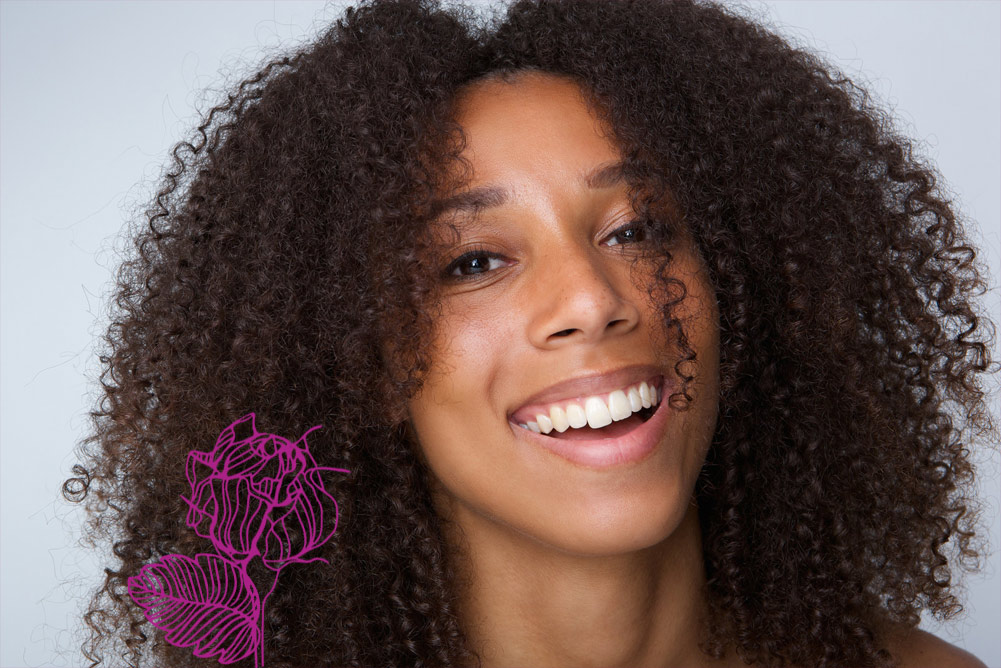
- You want to be able to offer new and exciting haircare products to your customers.
- You want your brand to reflect your values, using high-quality, natural, and organic ingredients.
- You want to finally find the answer to your haircare struggles, and create the products of your dreams.
So… what’s holding you back?
I don't know where to start, or how to properly make the products...
I got frustrated with the lack of information, so I gave up trying...
What I've read on the internet just confuses me...
Nothing I've tried so far has worked, and I'm not sure why...
You just need to know where to look!
If you’ve already been experimenting with DIY haircare products, you’ve likely had an experience similar to these:
"My first and only attempts at making castile-soap shampoo left me with crazy, frizzy, monster hair..."
"My homemade coconut oil shampoo left my scalp itchy and my hair gunky. Coconut milk left my hair too greasy..."
"I'm frustrated. Everything I've tried just dries out my hair, gives it a rough texture, or just weighs it down..."
"My hair needs more than just apple cider vinegar. It needs moisture, but nothing's worked..."
Do any of these problems sound familiar? It can be so frustrating to try again and again, and not know how to fix your formulation problems—or even identify what’s causing the issue in the first place!
Or maybe you have tried formulating haircare products properly—with surfactants and emulsifiers—but have still experienced challenges such as:
Getting the right consistency, viscosity, or slip to your products
Achieving the proper pH
Knowing what extracts, oils, and specialized ingredients to add
Creating the right surfactant system, and making sure there's enough foam with a sulfate-free shampoo
Understanding the natural options for surfactants and conditioning ingredients
There is a much easier way.
Introducing the
DIPLOMA in NATURAL HAIRCARE FORMULATION
Say goodbye to frizzy hair, itchy scalp, and products that don’t work!
In this course, you’ll learn:
How to make shampoo without harsh sulfates like SLS, and instead discover a wide variety of gentle, natural surfactants.
How to make conditioners that leave the hair smooth, soft, and silky, with a natural shine (and not weighed down or greasy.)
About the characteristics and needs of different hair types, and how to customize your formulations to suit them.
Real information about what the scalp needs to be healthy.
The functions, properties, and benefits of a wide range of natural and organic haircare ingredients, so you can select ingredients for your formulations with confidence.
How to formulate effective and professional shampoos, conditioners, and hair treatments that leave hair strong, healthy, and shiny.
Praise for the Diploma in Natural Haircare Formulation
Who is this course for?
If you want to make your own haircare products, gain the skills to formulate your own custom solutions in a way that is creative, rewarding, and in line with your values, the Diploma in Natural Haircare Formulation is for you.
If you’re ready to craft a hobby that can be launched into a business and a brand that speaks to effective, natural solutions for hair and scalp, then this course is for you! And if you’re a beauty entrepreneur who is ready to expand your current range, and take your business to the next level, by offering safe, natural haircare products this course is for you as well! Our ideal students typically fall into one of these categories:
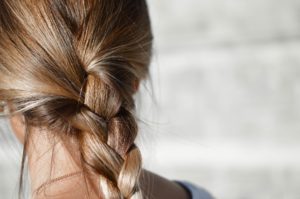
You’re a natural & organic beauty enthusiast who is very specific about the products and ingredients you put on your skin. Maybe there’s a specific haircare concern you’ve always struggled with, but there just isn’t a product out there that speaks to your values, while providing the benefits you need. You want to learn how to create those dream products and finally know the secrets to happy hair, scalp, and skin—without using chemicals and ingredients you don’t like!
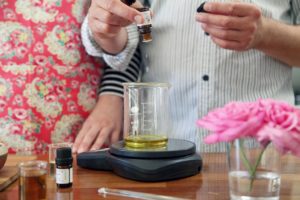 You’re a beauty enthusiast who dreams of one day launching your own brand, and you want to learn how to create professional-quality, unique, and meaningful organic and natural products. You’re ready to upgrade from DIY to professional skills and training.
You’re a beauty enthusiast who dreams of one day launching your own brand, and you want to learn how to create professional-quality, unique, and meaningful organic and natural products. You’re ready to upgrade from DIY to professional skills and training.
You may already making your own natural skincare products, and maybe have made some body butters, balms, lotions or creams, but you’re ready to get more serious and professional—and branch out into haircare, too.
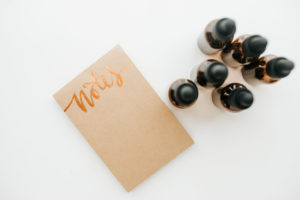
You’re already selling your products, and want to diversify your range. You want to offer something that very few others are offering, fulfil customer requests, and provide more value to your current customers, while attracting a whole new range of people who are specifically looking for haircare and scalp solutions. You know you need the training to do it right, right from the start, and you are ready to take your brand to the next level.
Get Connected: Our private student & graduate online community is there for you, every step of the way!
Study from anywhere in the world, at your own pace—but never feel like you’re on your own! Our students benefit from a wonderful private online community, where they can chat directly with their fellow students and graduates of the course. It’s one of the benefits that our students bring up, again and again, as a factor that helped them succeed. If you’ve been trying to study on your own, or if courses and information just aren’t available in your area, an online course is a perfect fit.
Praise for the Diploma in Natural Haircare Formulation
About the School of Natural Skincare International
The School of Natural Skincare International is a multi-award-winning online natural cosmetic formulation school. Our accredited, multimedia online courses cover every aspect of skincare and haircare formulation and are studied from home, wherever our students are in the world, via our online classroom, and with tutor and community support every step of the way.
Founded in 2010 by Directors Gail and Gareth Després, to date the School has trained over 15,000 students in 150 countries to make their own natural and organic skincare and haircare products and launch successful businesses.
The School’s team of expert tutors include cosmetic scientists, cosmetic formulators, aromatherapists, beauty business experts and safety assessors, and all are passionate about helping you create beautiful natural cosmetics and thriving businesses.
The School’s fabulous formulations and fun, creative classes have been featured by the BBC and glossy magazines like Green Parent, Spirit & Destiny, and Country Homes and Interiors Magazine.
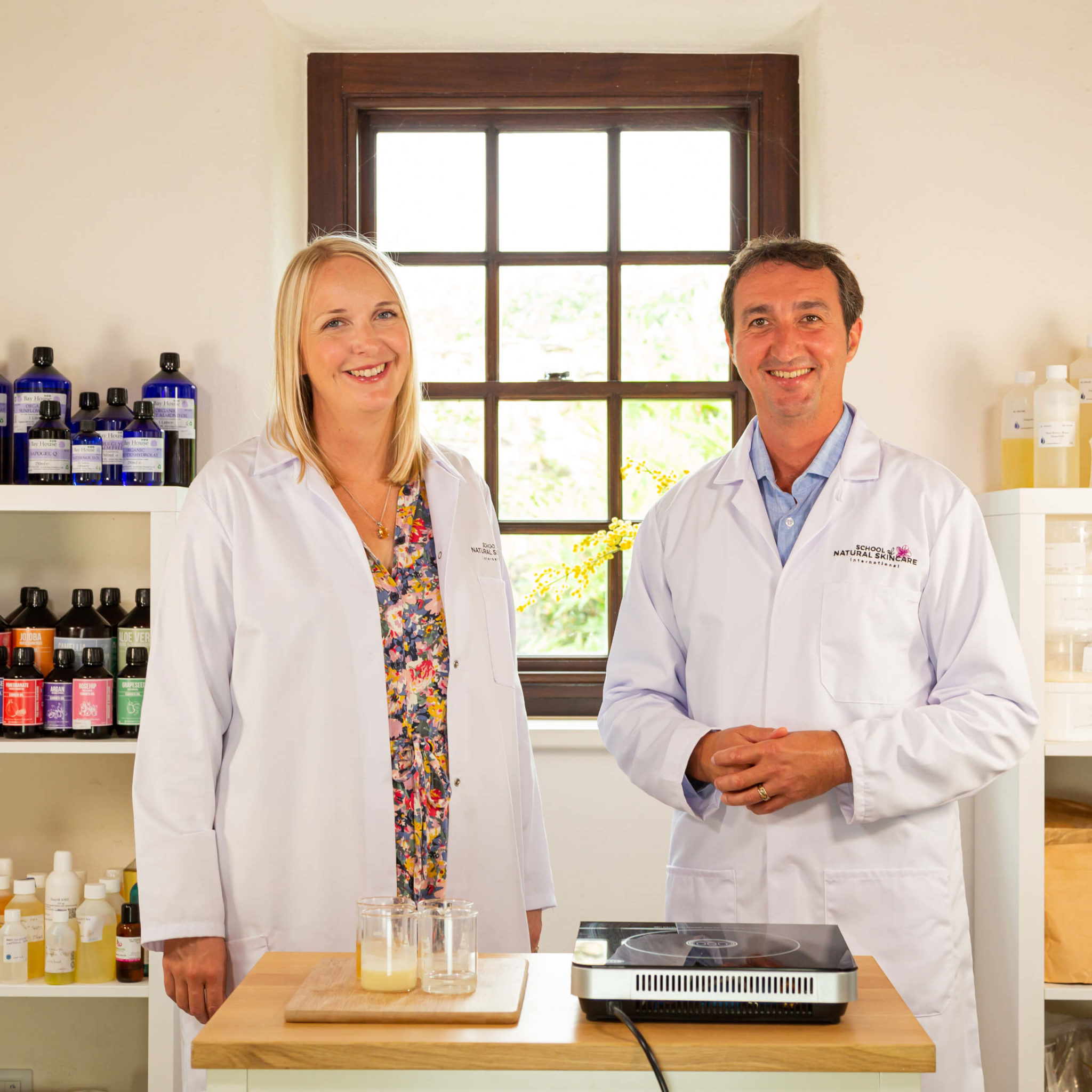
Praise for the School of Natural Skincare
We created this course as a response to many of these frustrated, failed attempts, and the abundance of misinformation on the subject of natural haircare formulation. As product creators ourselves, we’re firm believers in the idea that the only things standing between you and success are information, and the support you need to succeed. Maybe it didn’t work before, when you tried. But now, the information is all at your fingertips. And, you’ll get to learn from the vast experience of our graduates and tutors—something that is incredibly valuable for continued success! That’s why we began the School of Natural Skincare, and that’s why we’re offering this course to you. We are uniquely positioned in the field of natural beauty product formulation to give students a comprehensive overview of product creation, materials safety, ingredient knowledge, specialized manufacturing know-how, and key business insights to allow your beauty brand to grow, thrive, and flourish.
Praise for the Diploma in Natural Haircare Formulation

Maybe instead of forcing it, struggling, trying harder, you can try easier.
When you invest in your own future by signing up for the Diploma in Natural Haircare Formulation, you’re declaring that you are ready to take the next steps with your haircare formulation goals. You’re ready to learn everything you need and receive extra support so you can quit wasting time, energy, and ingredients through frustrating trial-and-error.
So, are you ready to learn how to create professional haircare products, the right way, from a team of experts?
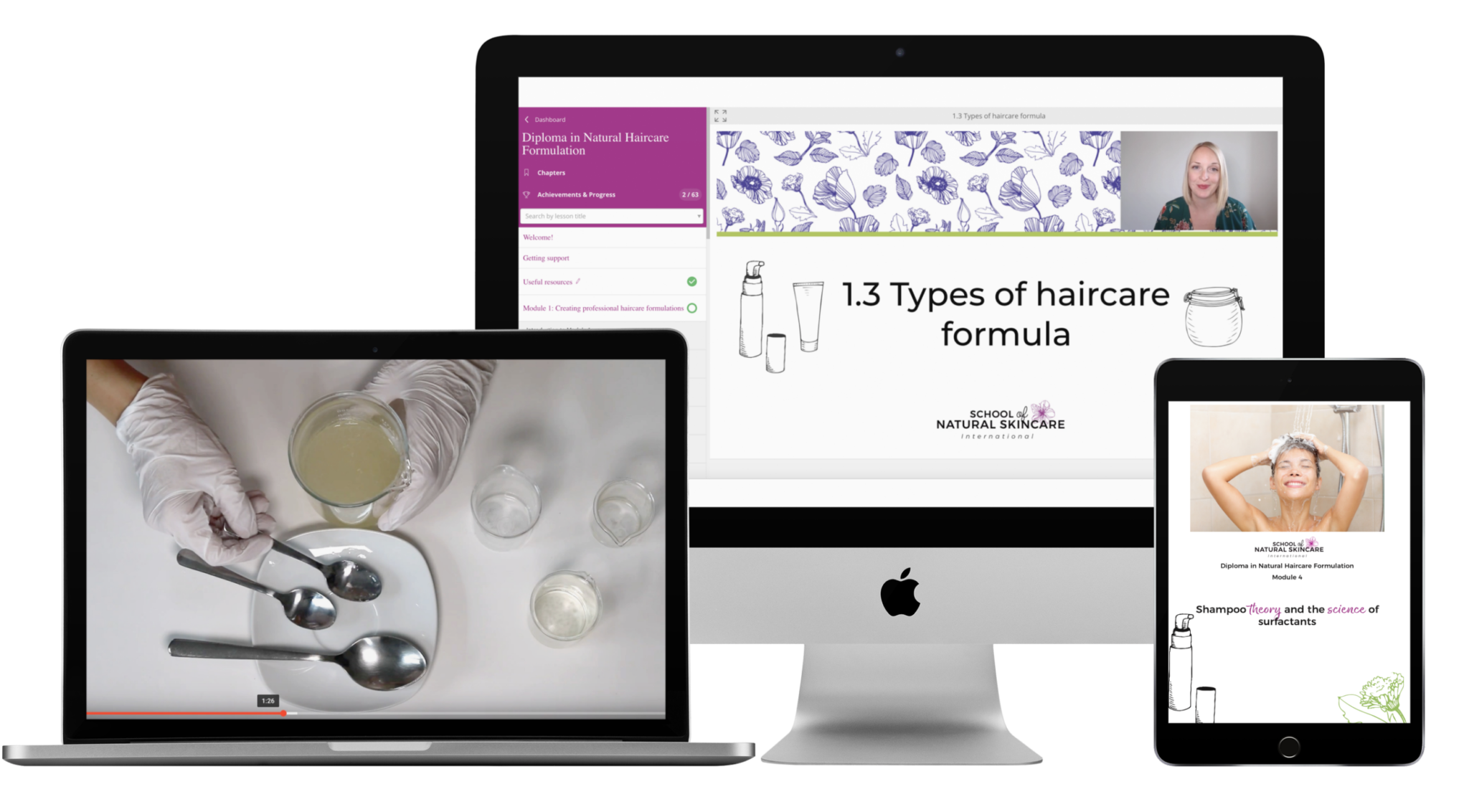
10 in-depth modules
10 textbooks
80+ videos
15+ fillable and printable worksheets
8+ ingredient workbooks and charts
Study from anywhere in the world, in your own time!
Private online student community: Get support from your fellow students and graduates.
Your questions answered and your assignments personally marked by our Cosmetic Scientist.
Course Overview
Course Outcomes
In this course, you’ll learn how to:
Become an effective formulator, write professional formulations and evaluate your formulations to achieve the perfect product.
Describe the biology of the hair, identify the stressors that cause damage to the hair and discuss how a proper haircare routine protects the hair from damage.
Set up a small home lab with the appropriate equipment, adhere to good manufacturing practice, carry out key production process techniques, and make batches of varying sizes.
Explain how a shampoo works, describe the structure of a shampoo formula, and discuss the role of surfactants in haircare products.
Choose ingredients with confidence, understanding the functions, properties and benefits of a wide range of ingredients, and how to select ingredients for your formulations.
Formulate and make a range of natural or organic shampoos, as well as how to adapt your formulation to suit dry hair or oily hair.
Explain how a conditioner works, describe the structure of a conditioner formula, and apply your understanding of emulsification to successfully create emulsions.
Formulate and make a range of hair conditioners including rinse off conditioner, intensive conditioner/mask, leave-in conditioner and detangling spray.
Formulate and make a range of hair treatments and styling products.
Comply with cosmetic, labeling, and claims regulations.
Module 1: Creating Professional Haircare Formulations
In this module, you’ll identify the steps in the product design process, develop a product concept using a product development brief, write a formula in the correct way, and evaluate it against a benchmark.
1.02 Your brand values and formulating to a standard In this lesson, you’ll establish your personal or brand values, and decide how you will demonstrate those values. You’ll also review the different standards for natural and organic cosmetics, interpret standards for vegan, cruelty free, fairtrade and gluten-free cosmetics, and select the standard you will adhere to.
1.03 Types of haircare formula This lesson covers how to classify cosmetic formulas as anhydrous, aqueous, or emulsions. You’ll be able to state the characteristics of each formula type, including the types of ingredients they contain, recognize which formula types require preservatives and/or antioxidants, and give examples of the uses of each formula type.
1.04 What is a formula? You’ll learn how to characterize the differences between cosmetic recipes and formulas, summarize the information included in a formula, write a formula in the correct manner, and explain why professional cosmetic products are written as formulas.
1.06 Using a product development brief After this lesson, you’ll be able to articulate what a product development brief is, identify the benefits of using one, select the information to include, and use a product development brief to design your products.
1.07 Using a benchmark This lesson covers what a benchmark is, and after completing it, you’ll be able to explain the benefits of using a benchmark, and complete a benchmark product analysis. This lesson also includes the benchmark analysis worksheet.
1.08 Product Evaluation You’ll be able to identify the product characteristics to evaluate, and complete a sensory product evaluation, after completing this lesson. This lesson also includes the product evaluation worksheet.
Module 2: Hair Biology and Hair Types
To understand how to formulate haircare products, you first need to understand how the hair and scalp function. In this module, we’ll take a dive into the anatomy and physiology of hair, so you can understand the root cause of various issues, and learn how to approach them.
2.02 Composition and structure In this lesson, you’ll learn to identify the three primary layers of the hair shaft. You’ll also understand the role the cuticle plays in the appearance of hair and in protecting the cortex against outside factors that cause hair damage. After completion, you’ll be able to state the chemical composition of hair, and explain why the pH of hair care products should be in the slightly acidic range.
2.03 Physical properties After this lesson, you’ll be able to define the most important mechanical property of the hair, summarize how water affects hair, identify which ingredients can penetrate the hair shaft, and describe how friction affects hair, and how to reduce static electricity.
2.04 Hair types and shape This lesson covers the two systems traditionally used to classify hair types. We’ll cover the structural differences in Caucasian, Asian and African hair in terms of its cross-sectional shape, degree of curl, sebum and shine, grooming ease and breakage, maximum length and strength.
2.06 Hair damage This lesson covers many different factors that lead to hair damage, including the four types of stressors that cause damage to the hair, and the characteristics of damaged hair. We’ll explain why protecting the hair through the use of products and avoiding stressors is so important.
2.07 Caring for hair In this lesson, we cover the four aspects to consider in your proper haircare routine for Caucasian and Asian hair, as well as a proper haircare routine for Afro-textured hair.
2.08 Dandruff and anti-dandruff properties This lesson provides an overview of what dandruff is, what causes it, which ingredients have anti-dandruff activity, and the regulations of anti-dandruff products.
Module 3: Lab Skills, Equipment, and Packaging
Setting up a lab at home isn’t difficult, but you need to know how to do it right in order to achieve the results you want. This module gives you all the information you need to decide what kind of lab setup is right for you, what kind of equipment you’ll need, and how to use and maintain your equipment and workspace so that your products are safe and turn out just the way you want.
3.02. Good Manufacturing Practice (GMP) GMP is essential for producing high-quality products and is a fundamental requirement if you sell your products. Our handy checklist will ensure that you have easy-to-follow guidelines in place.
3.03. Lab techniques and skills In this lesson, we’ll cover some of the key production process techniques that you’ll carry out in your lab when creating your products. We’ll cover how to weigh ingredients, how to create a water bath or bain-marie, how to clean, sanitize, and calibrate your equipment, and more.
3.05. Calculating batch sizes After this lesson, you’ll become confident working in percentages and calculating weight-based measurements for different batch sizes.
3.06. How to choose packaging This lesson provides an overview of the purpose of cosmetic packaging, as well as eight factors to consider when choosing packaging, including formulation type, dispensing component, ability to protect the product, compatibility of ingredients, brand appearance, trends, cost, and availability.
Module 4: Shampoo Theory and the Science of Surfactants
Shampoo is probably the first cosmetic product that comes to our minds when thinking about hair care, and it tends to be the basis of any haircare routine. This module will introduce the function, structure, and formulation of shampoo.
4.02. The structure of a shampoo formulation In this lesson, we will cover the typical structure of a shampoo formula, the types of ingredients used and their function, and what factors to consider when choosing ingredients.
4.03. The science of surfactants Surfactants are an important category of ingredient in cosmetics, and the basis for every shampoo and conditioner formulation. In this lesson, you’ll discover what a surfactant is, as well as the structure and function of surfactants.
4.05. Calculating active matter In this lesson, we will cover what active matter of a surfactant is, how to calculate active matter in a formulation, and how to apply the knowledge of surfactant active matter in formulating. You’ll also gain access to the active matter calculator, for your own formulations.
Module 5: Additional Ingredients
In this module, we’ll explore the functional and aesthetic ingredients which can be used to enhance the value and performance of your haircare products.
5.02. Conditioning agents In this lesson, we’ll explore some of the additional ingredients that have conditioning effect on the hair, including emollients, occlusives, humectants, natural silicone replacements, and cationic ingredients.
5.03. Preservatives and chelators Preservatives are included in cosmetic formulations to ensure that the product is safe, and they’re essential to prevent the growth of bacteria, fungi, and mold. This lesson will cover how preservatives work, how to choose the one that’s right for your product, as well as the function of chelating agents.
5.05. Active ingredients: Cosmeceuticals, vitamins, and plant extracts There are many active ingredients available to enhance your products performance. In this lesson we will take a closer look at some of them, including vitamins, cosmeceuticals, and botanical extracts.
5.06 pH adjusters It is crucial that your haircare products have the correct pH or they could actually damage your hair. In this lesson we will briefly cover which pH adjusters are used in cosmetic products.
Module 6: Formulating and Making Shampoos
Our formulation templates, examples and worksheets will take away the guesswork and help you create haircare formulas like the professionals, and our video demonstrations show you step by step how to make each type of shampoo. In this module, you’ll learn how to formulate a variety of different shampoos for different hair types and haircare concerns.
6.2 Formulating shampoo for different hair types Learn how to modify shampoo formulas to suit different hair types including normal, dry, oily and Afro-textured hair (which has some specific requirements).
6.3 Formulating regular shampoo We’ll share a formulation template plus an example formulation for a Gentle Aloe & Chamomile Shampoo. We’ll show you how to modify the formula for dry hair and oily hair too. It’s like looking over a formulator’s shoulder as they formulate!
6.4 Formulating clarifying shampoo Learn how to formulate clarifying shampoo by using our formulation template and watching step-by-step how our example formula for Citrus Burst Clarifying Shampoo is created. This example meets COSMOS standards too!
6.5 Formulating daily use shampoo Learn how to formulate a shampoo that is gentle enough to use everyday. Plus we’ll share a formulation example for a Rosemary & Nettle Daily Use Shampoo.
6.7 Formulating anti-dandruff shampoo Discover how to use natural active ingredients to reduce dandruff plus watch as we formulate a Tea Tree Anti-Dandruff Shampoo to ECOCERT standards.
6.8 Formulating solid shampoo bars Shampoo bars are really increasing in popularity! With the move to reduce the amount of packaging we use in our daily lives, these solid bars are a hit. Many on the market use harsh surfactants like SLS. In this lesson we’ll teach you to create your own gentle, natural (SLS free) solid shampoo bars. We include two examples a Fragrant Orange Shampoo Bar and Fortifying Shampoo Bar that is formulated to COSMOS standards.
6.9 Formulating your own shampoos Now it’s your turn! Use the Product Development and Formulation worksheets to create your own beautiful shampoo formulations!
6.10 Troubleshooting Shampoos Just incase you run into any difficulties, we’ve provided a handy checklist that will help you troubleshoot any issues you may encounter when creating your shampoos.
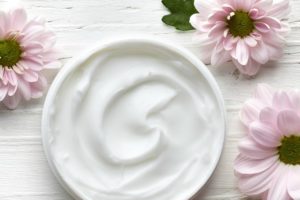
Module 7: Conditioner Theory and the Science of Emulsification
Conditioners is probably the second most popular product used on hair, and is also a great way to deliver specific, targeted ingredients to the hair and scalp. This module will introduce the function, structure, and formulation of conditioners.
7.02. The structure of a conditioner formulation In this lesson, we will cover the typical structure of a conditioner formula, the types of ingredients used and their function, as well as what factors to consider when choosing ingredients.
7.04. Types of emulsifiers for haircare In this lesson you will learn about most common emulsifiers used in haircare products and which of them are permitted in certified natural and organic products.
Module 8: Formulating and Making Conditioners
8.2 Formulating conditioner for different hair types After this lesson, you’ll know how to modify conditioner formulas to suit different hair types including normal, dry, oily and Afro-textured hair (which has some specific requirements).
8.3 Formulating rinse-off conditioners Learn to formulate the most popular type of conditioner! Plus look over our shoulder as we formulate a COSMOS standard Shea and Coconut Conditioner for Dry Hair so you can see step-by-step how a rinse-off conditioner formula is put together.
8.4 Formulating leave-in conditioner Leave-in conditioners make combing easier and reduce static electricity. As they are left on the hair there are some special considerations to be aware of when formulating. Plus we’ll share our example formula for a Volumizing Green Tea Leave-in Conditioner.
8.5 Formulating intense conditioner/ hair masks Intense conditioner is usually thicker and can be referred to as hair mask. It benefits very dry and/or damaged hair and contain higher amounts of cationic ingredients along with oils and butters to nourish the hair. Plus we’ll give you a gorgeous formula for an Argan Repairing Intense Conditioner formulated to COSMOS standard.
8.7 Formulating co-wash Co-wash stands for ‘conditioner only’ wash. Co-wash is very popular with people with Afro-textured hair, due to the fact that that type hair is rather dry and can get even drier after shampooing. Co wash provides a little bit of cleansing action and a lot of conditioning, which benefits dry hair. We include a formulation example for a Herbal Boost Co-wash.
8.8 Formulating solid conditioner bars This lesson covers how to formulate solid conditioner bars, such as our luscious Honey & Banana Deep-Conditioner Bar. Solid conditioner bars are hugely popular and with good reason. Soon you’ll be formulating and making your own!
8.9 Formulating your own conditioners This lesson includes product development briefs, formulation templates, and worksheets to enable you to formulate your own range of gorgeous conditioners.
8.10 Troubleshooting conditioners After completing this lesson, you’ll know how to troubleshoot the most common issues that arise when creating conditioners.
Module 9: Hair treatments and styling products
There is a whole range of possibility for haircare products beyond shampoo and conditioner! This module covers a variety of treatments and specialized haircare products to styling, protective, and clarifying solutions for the scalp.
9.2 Formulating hair oil Learn how to formulate nourishing hair oils and practice with our example for a Reviving Hair Oil.
9.3 Formulating anhydrous hair mask/butter Formulate hair masks and butters to use as a pre-wash treatments or a leave-in after-wash treatments. We’ll share a formulation example for a beautiful Monoi Beauty Butter for Hair.
9.4 Formulating hair wax This 100% natural styling product lubricates the hair, creates a wet-look effect, and offers light hold. Formulate your own plus receive our example Mojito Hair Wax formula.
9.5 Formulating anti-frizz spray This is the only product on the entire course that isn’t formulated to natural or organic standards. For this particular product the natural alternatives just aren’t as effective.
9.6 Formulating dry shampoo Reduce oiliness on the scalp and increase the time between washes with a natural dry shampoo. We’ll share our example formula for a Purifying Dry Shampoo with Clay plus a formulation template so you can easily formulate your own!
9.7 Formulating clay based mask Gently clean oil and dirt from the scalp and hair with a clay based hair mask. Enjoy our example formula for a Detox Clay Hair Mask.
9.8 Formulating Ayurvedic paste shampoo Discover Ayurvedic saponin-rich plant powders that are used to gently clean oil and dirt from the scalp and hair. We’ll share our formula for an Ayurvedic Color-protect Paste Shampoo.
9.10 Formulating scalp serum Formulate a gel-based scalp serum to deeply nourish and tone skin on the scalp, to stimulate hair roots and protect newly grown hair. Includes our example formula for a Tonifying and Protecting Scalp Serum.
9.11 Formulating hair gel Formulate a COSMOS standard hair gel that offers medium to strong hold for hair styling purposes. Practice with our example Nourishing and Styling Hair Gel formula.
9.12 Formulating salt spray Salt sprays offer mild hold, enhance curls and create a tousled beach look. They are easy to make and fun to use! We’ll share our Summer Look Salt Spray formula for you to practice with.
9.13 Formulating heat protection spray Learn about natural protective ingredients that can be used to formulate a heat protection spray. We’ll share our example formula for a Grapefruit Thermo-protect Spray that uses innovative, natural protective ingredients.
9.14 Formulating your own hair treatments and styling products Now it’s your turn to practice formulating hair treatments and styling products! We’ve provided four Formulation Worksheets to help you:
- Powdered products (dry shampoo, clay mask, Ayurvedic paste shampoo)
- Anhydrous products (hair oils/anhydrous masks/wax/anti-frizz spray)
- Gel-based products (hair gel/scalp gel serum)
- Water-based products (heat protection spray/salt spray)
9.15 Troubleshooting hair treatments and styling products After completing this lesson, you’ll know how to troubleshoot the most common issues that arise when creating hair treatments and styling products.
Module 10: Cosmetic Regulations
Understanding how to formulate safe products that will meet standards for sale in your country is essential for bringing products to market. This lesson covers the cosmetic regulations that apply to products being sold in the USA, Canada, UK, EU, India, South Africa, Australia and New Zealand. Additionally, we provide information on how to find other regulations, as applicable, in other locations.
10.2 Cosmetic product testing In this lesson we cover types of cosmetic product testing and assessment explained, including microbiological/challenge testing, stability testing, Cosmetic Product Safety Reports, and other (optional) tests.
10.4 International Fragrance Association (IFRA) guidelines and calculating allergen levels In this lesson cover IFRA standards and definition of classes, IFRA conformity certificates, allergen reports and calculating allergen levels in your product.
Join the Diploma in Natural Haircare Formulation!
Yes, I’m ready to become a natural haircare formulator
Enroll now for one simple price of
- Check the price in different currencies on xe.com.
- Instant access to course.
Enroll now with six monthly installments of
- Check the price in different currencies on xe.com.
- When you join a payment plan the first payment is paid immediately and subsequent payments are paid automatically one month apart.
- Choosing the payment plan option means that you will receive the course content on a “drip schedule”. This means that new content is released each time you make a monthly payment. A full breakdown of the release schedule can be found in the FAQ section at the bottom of this page.
Want to try before you buy?
Sign up for a free trial!
Sample a selection of course materials inside our online classroom.
Or join the Natural Haircare and Skincare Formulator Program!
The program includes our Diploma in Natural Skincare Formulation and Diploma in Natural Haircare Formulation.
Save US $497 when you enroll on both courses together plus get 9 bonus classes for free:
- Formulating with AHAs and BHAs (released 2021)
- Digital Copy of the International Bestselling Book A-Z of Natural Cosmetic Formulation
- Formulating Face and Body Washes with Natural Surfactants (released 2021)
- Formulating Vegan Skincare
- Formulating with CBD and Hemp Seed Oil
- Formulating Advanced Natural Deodorants
- Men’s Facial Hair products
- Children’s Haircare products
- Formulating party-ready hair products – naturally!
The full details of the program can be found here.
Yes, I want to enroll on the program!
Option 1: Monthly enrollment fee of US $157 a month for 12 months
- Our lowest monthly payment plan.
- Gain access to new course materials each month for 12 months.
Option 2: One single enrollment fee of $1,497
- Save $387 compared to the monthly plan or $497 compared to enrolling on the courses separately.
- Access all the course materials and bonuses immediately after enrollment.
We accept all major debit and credit cards and Paypal

By joining the course you accept our terms and conditions found here.
Praise for the Diploma in Natural Haircare Formulation
FAQs
Is the course accredited?
I live in Australia/USA/India/ _______ (insert country here). Can I still take the course?
Are there any assignments? Will I get a certificate at the end?
When can I enroll?
Do you teach how to formulate products for Afro-textured hair?
In addition to this we provide formulation examples suitable for many hair types, including Afro-textured, and also formulations targeted specifically at Afro-textured hair types.
As Afro-textured hair has different characteristics and needs we have sections in the following lessons dedicated to Afro-textured hair:
2.4 Hair types and shape covers the structural differences in Caucasian, Asian and African hair in terms of its cross-sectional shape, degree of curl, sebum and shine, grooming ease and breakage, maximum length and strength and the implications of this for haircare
2.7 Caring for Hair includes a section on caring for Afro-textured hair
6.2 Formulating shampoos for different hair types includes formulating for Afro-textured hair. This means you’ll be able to adapt/create formulations designed for the needs of Afro-textured hair.
8.1 Formulating different types of conditioner includes a section on Co-Wash (popular among people with Afro-textured hair type)
8.2 Formulating conditioners for different hair types includes formulating for Afro-textured hair. This means you’ll be able to adapt/create formulations designed for the needs of Afro-textured hair.
8.7 Formulating co-wash Includes a formulation template for co-wash (which you can adapt to create your own formulation) and a formulation example for co-wash for dry hair.
9.2 Formulating Hair treatments: We include treatments suitable for Afro-textured hair including hair oil, hair butter/mask, clay hair mask.
The course has been designed in such a way as to teach students how to care for and formulate for Afro-textured hair types (and other hair types too).
Are there set lessons to do on specific days or can you do it in your own time?
How long will I have access to the course?
Why are your prices in US$?
I don’t have any experience, is the course still suitable for me?
We include all the foundations of formulating in Module 1: Creating Professional Haircare Formulations and the practicalities of setting up and lab and making products in Module 3: Lab Skills, Equipment, and Packaging. These modules have been included to enable beginners to join the course and are a useful refresher for students with more experience.
What help is available if I need it?
The course is primarily designed as a self-study course. It takes a very thorough step-by-step approach and each module builds on the next. Therefore as you progress through the course, you’ll gain the skills and knowledge needed to become an expert formulator.
Inside the online classroom, we host a weekly Q&A with our Formulation Tutor, who can answer any questions you have about the course materials as you work through them.
When you sign up to the course you also get to join our private online student community (hosted on Facebook), where you can meet and discuss with other students and graduates, who have lots of knowledge, expertise and ideas to share.
Where do I buy the ingredients and materials that I need?
We have featured a range of ingredients in the course including those that are more common and easy to obtain. You can find an ingredient starter list here.
Depending on where you are based and what you want to buy you may need to order specialist ingredients from overseas. It is also possible to substitute ingredients for similar ones.
What will the release schedule of course content be if I choose a payment plan?
If you choose to spread the cost of your course by choosing a payment plan, you will not receive all of the course content in one go. Instead, each time we receive your monthly payment, the next installment of your course will be released, according to the following schedule.
Diploma in Natural Haircare Formulation Release Schedule:
Month 1: Haircare Diploma Modules 1-3
Month 2: Haircare Diploma Modules 4-5
Month 3: Haircare Diploma Module 6
Month 4: Haircare Diploma Module 7-8
Month 5: Haircare Diploma Module 9
Month 6: Haircare Diploma Module 10
